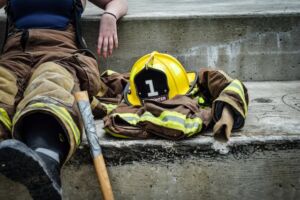From police officers to paramedics and rescue workers to firefighters, first responders live up to their title daily. They are on the scene of an emergency or disaster before anyone else. It is their job and we praise them for it. But how many of us recognize that witnessing so much suffering and death can constitute an emergency in and of itself?
First responders are expected to run toward the crisis, remain calm, and make life-saving decisions on the spot. Over time, however, this challenging routine can become a source of trauma itself. It can lead to post-traumatic stress disorder (PTSD) just as easily for the responders as the situations do for the victims.
Key Statistics About PTSD in First Responders
We’re not talking about a rare occurrence. More than 8 out of 10 first responders endure a variety of different traumatic events on the job. They suffer from mental health issues far more than the general population — and that includes PTSD.
To get a brief glimpse at the rate of PTSD and potential PTSD amongst first responders, here are some key statistics:
- Some 400,000 U.S. first responders have been diagnosed with PTSD.
- While 20 percent of people in the general population will develop PTSD, that number is 33 percent for first responders.
- This includes 15 percent of emergency personnel and 13 percent of rescue teams.
- Currently, 25 percent of firefighters are being treated for PTSD and one-third of them are struggling with alcohol addiction.
- For law enforcement officers, the current rate is 33 percent. Since 2020, they are more likely to die by suicide than on the job.
There’s one number we cannot quantify. Since first responders, as a group, tend to not complain and avoid conversations about their victimhood, we do not know how many are suffering in silence. The numbers above may constitute a drastic undercount.
How Do You Know If a First Responder May Have PTSD?
They may fear being called weak and thus hide symptoms but you can still watch for these red flags:
- Feeling that all the efforts are wasted and blaming themselves for never doing enough
- Self-medicating through alcohol, drugs, or risky activities like gambling or pornography
- Re-living traumatic events
- Blacking out about the specifics of traumatic events
- Sleep and appetite disruptions (either much more or much less)
- Dissociation
- Social withdrawal and self-isolation
- Refusing to ask for help
- Recurring thoughts of death
- Talking about self-harm or suicide
 Any of the above is reason for concern especially if such signs persist for more than a couple of weeks
Any of the above is reason for concern especially if such signs persist for more than a couple of weeks
How Can First Responders Prevent PTSD and Get Help?
The first step is embracing self-help while rejecting fear of judgment. First responders must individually and collectively work to shatter the “hero” stigma. This isn’t a movie. If they feel overwhelmed, exhausted, or scared, it’s normal. Speaking up can contribute to cultivating a workplace where more people feel comfortable discussing mental health.
On a more personal level:
- Become more aware of your limits.
- Set and enforce boundaries.
- Make the most of your time off to create positive memories.
- Practice daily self-care.
Addressing PTSD is not something for them to try on their own. It’s an emergency and therefore requires that a first responder reach out for help. They may feel self-conscious, at first, but it helps to see a therapist as a professional equal. This way they can work as a team to process and resolve the repetitive trauma.
First responders can heal their minds and bodies — and strike a new balance at work. This requires coping mechanisms and emotional regulation. But that’s what therapy is for. If you know someone who is struggling, I’m here to talk. Reach out to learn more about trauma therapy.





